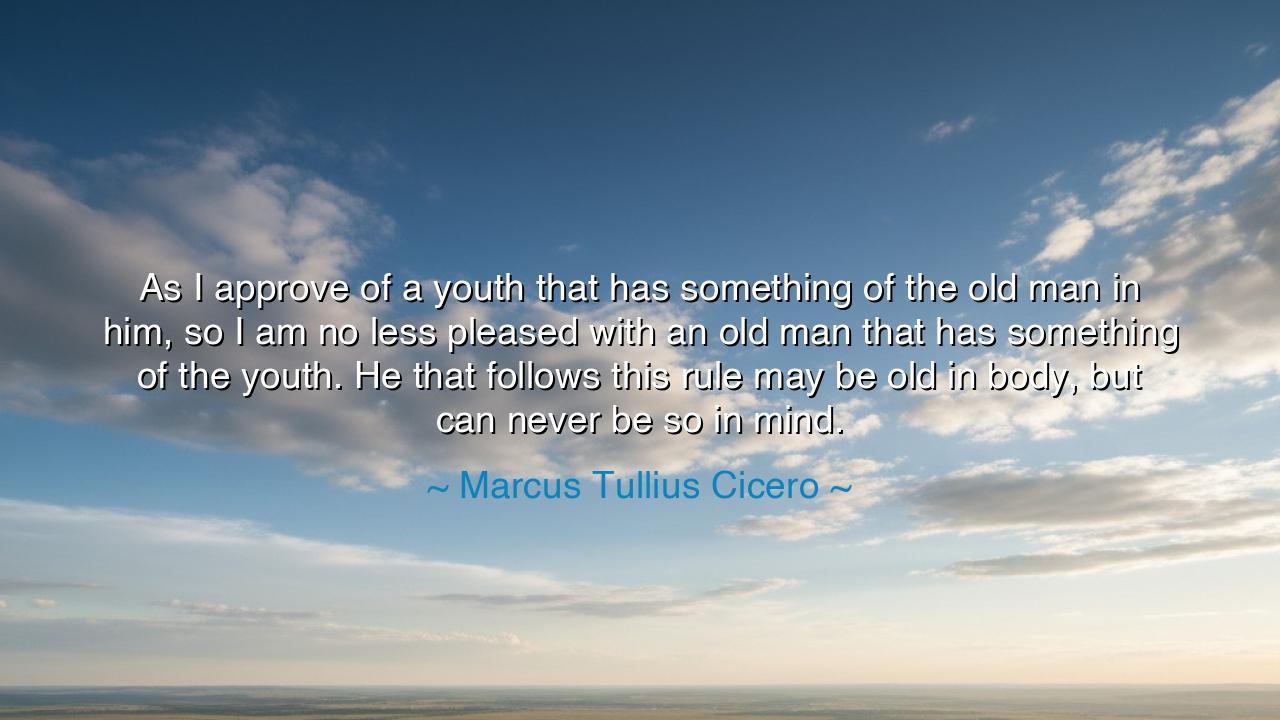
As I approve of a youth that has something of the old man in him
As I approve of a youth that has something of the old man in him, so I am no less pleased with an old man that has something of the youth. He that follows this rule may be old in body, but can never be so in mind.






"As I approve of a youth that has something of the old man in him, so I am no less pleased with an old man that has something of the youth. He that follows this rule may be old in body, but can never be so in mind." - Marcus Tullius Cicero. These words, filled with profound wisdom, reflect a belief in the unity of age and the timeless nature of the human spirit. Cicero, the great Roman philosopher, politician, and orator, understood that the key to true vitality lies not in the physical body, but in the mind and the spirit. He suggests that youth and age are not mutually exclusive; in fact, they should be intertwined in a way that brings the best of both worlds. A youth that carries the wisdom of the elderly possesses the foresight and temperance that time bestows, while an elder who retains the curiosity, energy, and hope of youth stays connected to the ever-renewing force of life.
Cicero’s philosophy resonates deeply with the ancients’ belief in the balance of opposites—a belief that to live fully, one must cultivate both wisdom and youthfulness, both experience and vigor. In ancient Greece, Socrates was a man who embodied this duality. In his later years, Socrates’ body may have been worn by time, but his mind remained sharp, forever questioning, learning, and embracing the world with the enthusiasm of a young philosopher. His mind remained alive, engaged, and ever-curious, showing that the spirit of youth could live on even in the most advanced stages of life. Socrates, though physically aged, had a mind that never stopped growing, never stopped seeking—and thus, he could never truly grow old in spirit.
This idea was not just philosophical but lived out in the lives of great figures. Consider Benjamin Franklin, who, even as an elderly man, retained a youthful curiosity about the world around him. His late years were filled with intellectual endeavors, scientific experiments, and diplomatic missions. Franklin never allowed his age to define his capacity to learn, create, or lead. He embodied the very essence of Cicero’s wisdom: his body may have grown old, but his mind remained as vibrant as ever, driven by the energy of a man half his age. His life is a testament to the truth that age is not a sentence to stagnation, but an opportunity to continue evolving.
Cicero’s reflection also implies that youth, with all its passion and vitality, can benefit from the steady hand and perspective that age brings. We see this in the mentorship of elder statesmen guiding the next generation. Mentors, like Confucius or Plato, took their life’s experience and imparted wisdom to the younger generations, infusing them with a deep sense of purpose, responsibility, and long-term vision. They understood that youthful energy, when combined with the wisdom of age, creates a force that is greater than either on their own. Youthful idealism, tempered with the wisdom of experience, can reshape the future in profound ways.
Yet, there is also a warning in Cicero’s words: age should not become a cloak for inactivity or cynicism. The danger, as we grow older, is to withdraw into the comfort of habit and routine, losing sight of the renewal and inspiration that should come with every stage of life. Cynicism, disinterest, and a resignation to the limitations of age can cloud the mind and spirit. As we age, we must resist the temptation to become fixed, rigid in our ways. Like the elderly philosophers, we must continue to be open to the future, to explore, to question, and to keep the fire of curiosity burning brightly.
Cicero teaches us that aging is not a condition to be feared or avoided but embraced as a natural process that can be rich in meaning. To age well is to cultivate both the wisdom of life’s experiences and the youthfulness of continued learning, exploration, and creativity. This is the path to vitality in later years, and it is a path that keeps the mind and spirit young, even as the body inevitably declines. Age does not need to signify the loss of energy or enthusiasm for life, but rather, it can become a time of deeper understanding, grounded optimism, and an unshakable belief in the potential for continued growth.
The lesson here is one of balance—of never allowing age to imprison us in complacency, nor to let youthful exuberance fade into reckless idealism without a solid foundation. Whether in youth or old age, we must constantly seek to bring the best of both worlds into our lives. Engage fully with life, maintain curiosity, and remain open to new ideas and challenges. The mind, like the body, is capable of growing, adapting, and thriving at any stage of life—if only we are willing to keep learning, keep striving, and keep reaching beyond the confines of time.






AAdministratorAdministrator
Welcome, honored guests. Please leave a comment, we will respond soon